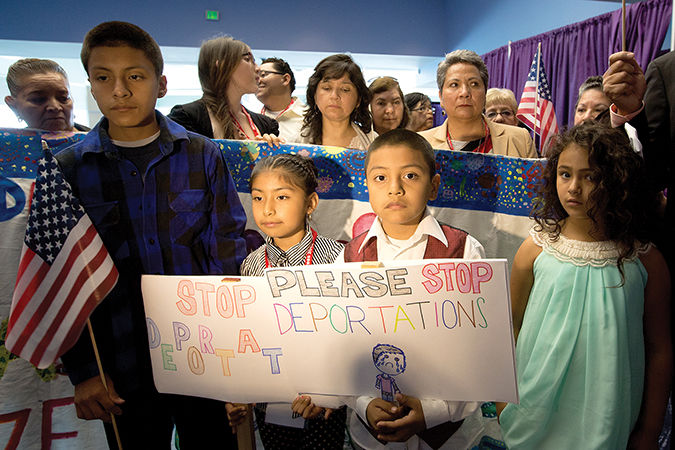Our Archdiocesan Religious Education Congress this past weekend was a great celebration of faith.
What a blessing to have so many thousands of people, from countries all over the world, coming to learn more about our Catholic faith and to be renewed in their dedication to the Church’s mission of the new evangelization.
It was a joy for me to be able to talk to so many of you and celebrate the Eucharist with you. It was a special joy to participate in the Youth Day at the Congress — and to see so many of our young people so happy to live and share their Catholic faith.
We are living in a beautiful springtime in our Church, as we enter the second year with our Holy Father Pope Francis.
This is a time for all of us to deepen our conversion to Jesus and to the journey of holiness he sets before us. As we have been reflecting during this Lenten season, Jesus is calling us to be people of the Beatitudes.
The Beatitudes teach us God’s way for us to find true happiness. And we know that God created us to be happy, to be blessed. Every one of us was born with this desire for happiness in our hearts. And God alone can fulfill this desire.
St. Augustine said many centuries ago: “You have made us for yourself, O Lord, and our heart is restless until it rests in you.”
This is still true. God alone satisfies.
The trouble is that we are tempted by our weakness and by our culture to forget that. Often we end up seeking happiness in the wrong places — in behaviors and pursuits that can entertain us or give us pleasure, but cannot satisfy the true longings of our hearts.
The Beatitudes express that “right order” that God intends for our lives. Through the Beatitudes, he is teaching us what we should desire and what we should be seeking in our lives. He is teaching us to seek the things that can really make us happy.
So in the fourth Beatitude, Jesus is calling us to hunger and thirst for righteousness.
Righteousness does not mean “absolute perfection” or that we never make a mistake. Righteousness in the Scriptures means “rightness” or justice.
Things are righteous when they are the way God wants them to be. As this Beatitude suggests, righteousness is something we are called to strive for; it’s not something we can hope to achieve in this life. Righteousness is the work of God. And we are waiting, as St. Peter said, for the day when he will bring “a new earth in which righteousness dwells.”
To seek righteousness means seeking to get “right” with God and “right” with the people around us. It also means seeking to make things “right” in the world we live in.
This is important to remember: The Beatitudes are not “private” virtues; even though they sound like they should be.
Jesus calls us to be “poor,” “meek” and “mourning.” These are personal qualities, character traits. But Jesus calls us to live these aspects of our Christian personality in ways that have consequences for our personal relationships and our mission in the world.
He wants us to be poor so we have more to give. He wants us to mourn in solidarity with those who suffer injustice. To be meek means we resist evil with good.
In the same way, in calling us to hunger and thirst for righteousness, Jesus wants us to seek holiness in our own lives and justice in our society and our world.
Again, Jesus is our model for the Beatitudes. In the Acts of the Apostles, he is called “the Holy and Righteous One.”
And he is the One we are called to seek. We are to hunger for Jesus — because he is Bread of Life. We are to thirst for him — because out of his heart, living water flows.
In this Beatitude, Jesus is calling us to be people of longing. Always seeking what is above — truth and beauty and the higher things of God. Always striving that God’s will be done on earth as it is heaven. That everyone in our world has what he or she deserves as a child of God, created in God’s image.
This longing for holiness and God’s Kingdom — this is the true path to the happiness our heart desires.
So let’s pray for one another this week. Pray that we may all grow in our desire for God.
And let’s ask Our Blessed Mother Mary to help us to hunger for holiness in our lives and to thirst for justice in our world.
Archbishop Gomez’s book, “Immigration and the Next America,” is available at the Cathedral Gift Shop (www.olacathedralgifts.com/immigrationandthenextamericarenewingthesoulofournation.aspx). Follow him at www.facebook.com/ArchbishopGomez.

